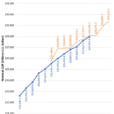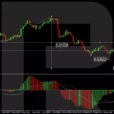The Bank of Japan raised its growth outlook, keeping monetary policy unchanged at its latest meeting. In the latest to be swept up in “reflation”, Japan’s central bank even trumpeted (pardon the pun) the expected Trump “stimulus” as a reason to be more optimistic. Why wouldn’t they? After all, there is no place on Earth that more appreciates government spending than that island nation. Appreciating what it actually achieves, however, is altogether different.
The Bank of Japan forecast an era of surging economic growth and kept monetary policy on hold on Tuesday following a Donald Trump-induced slide in the yen.
Japan’s central bank predicted the economy would grow significantly faster than its long-run trend to March 2019 based on easy monetary policy, government fiscal stimulus and a pick-up in growth overseas.
If it seems like we have been here before with Japan, minus the Trump, it is because we have. It is something of a regular feature in Bank of Japan communications where they upgrade their outlook using nearly identical and uniform language, only to be surprised later when that outlook fails often spectacularly. The last time the Japanese were so optimistic was late 2013, when BoJ then did as they have today. Board Member Sayuri Shirai told an audience Tokushima in late November 2013:
Looking ahead, while domestic demand is likely to maintain firmness, external demand is expected to increase moderately. Therefore, Japan’s economy is projected to continue growing throughout the projection period at a pace above its potential rate of growth (considered to be around 0.5 percent on average). The projection would remain unchanged even if the economy were affected by the front-loaded increase and subsequent decline in demand prior to and after the two scheduled consumption tax hikes, in April 2014 and October 2015.
As we know, that never happened and not even close. The reason for that is all the reasons the Bank of Japan (or economists in general) never seems able to comprehend. There is the monetary system as it actually is, rather than the theory of bank reserves disproven in Japan longer and farther than anywhere else, as well as the absurdity of trying to create a recovery and sustainable growth from out of large and imposing negative factors. Currency instability is not an economic cure, it is an economic curse.











Leave A Comment